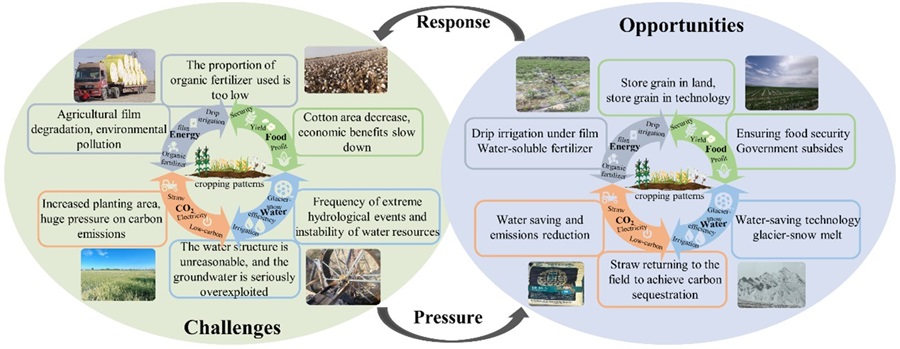Agricultural production consumes large amounts of water, energy and fertilization, and can be an unignorable source of carbon emissions.
The water-energy-food nexus aims to maximize the synergies between various elements, optimize the allocation of agricultural land and water resources, and promote sustainable agricultural development.
In a study published in Energy Conversion and Management, a research group led by Prof. CHEN Yaning at the Xinjiang Institute of Ecology and Geography (XIEG) of the Chinese Academy of Sciences, found that optimizing the allocation of water and soil resources has a clear impact on water saving and emission reduction in the Tarim River basin.
Researchers constructed a multi-objective optimization model to significantly increase the crop areas that ensures the maximum water-energy-food nexus index and the minimum CO2 emissions.
The study analyzed crop production and emissions reduction potential for rice, wheat, corn and cotton in the Tarim River Basin. Results showed that cotton, as a high water- and energy-consuming crop, had a lower water and energy use efficiency than other crops. Improvements in irrigation efficiency and mechanization in the basin had a significant impact on water conversation and carbon reduction. The intensity of agricultural CO2 emissions in the basin showed a decreasing trend from 1990 to 2020, with CO2 emissions from wheat production decreasing only slightly.
This study is of great value for optimizing crop production patterns, ensuring high efficiency and clean production in agriculture.
Article link: https://www.sciencedirect.com/science/article/pii/S0196890424001158#ab010

Opportunities and challenges of optimizing cropping patterns in the Tarim River Basin. (Image by XIEG)
Contact
LONG Huaping
Xinjiang Institute of Ecology and Geography
E-mail: longhp@ms.xjb.ac.cn
Web: http://english.egi.cas.cn
